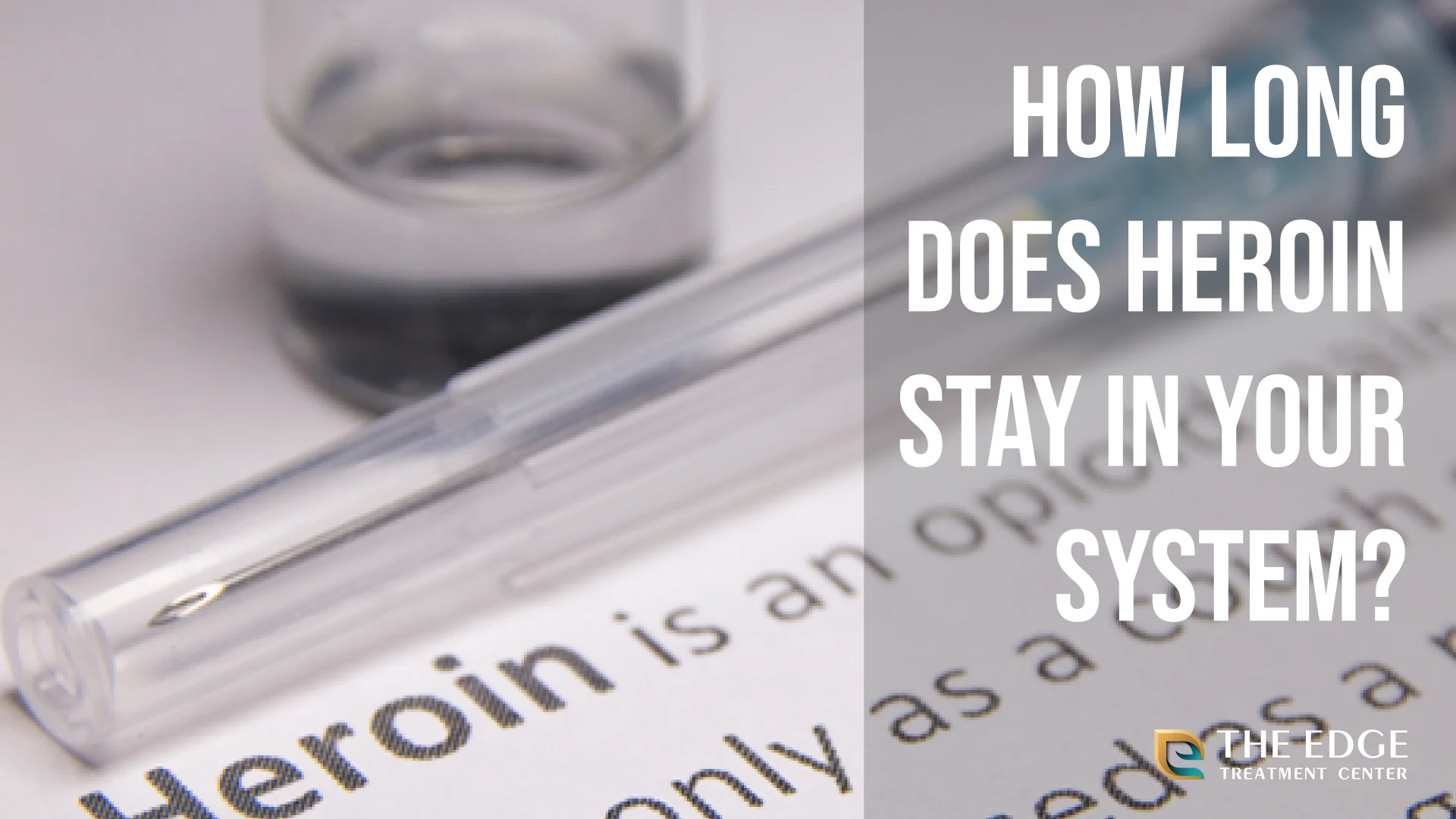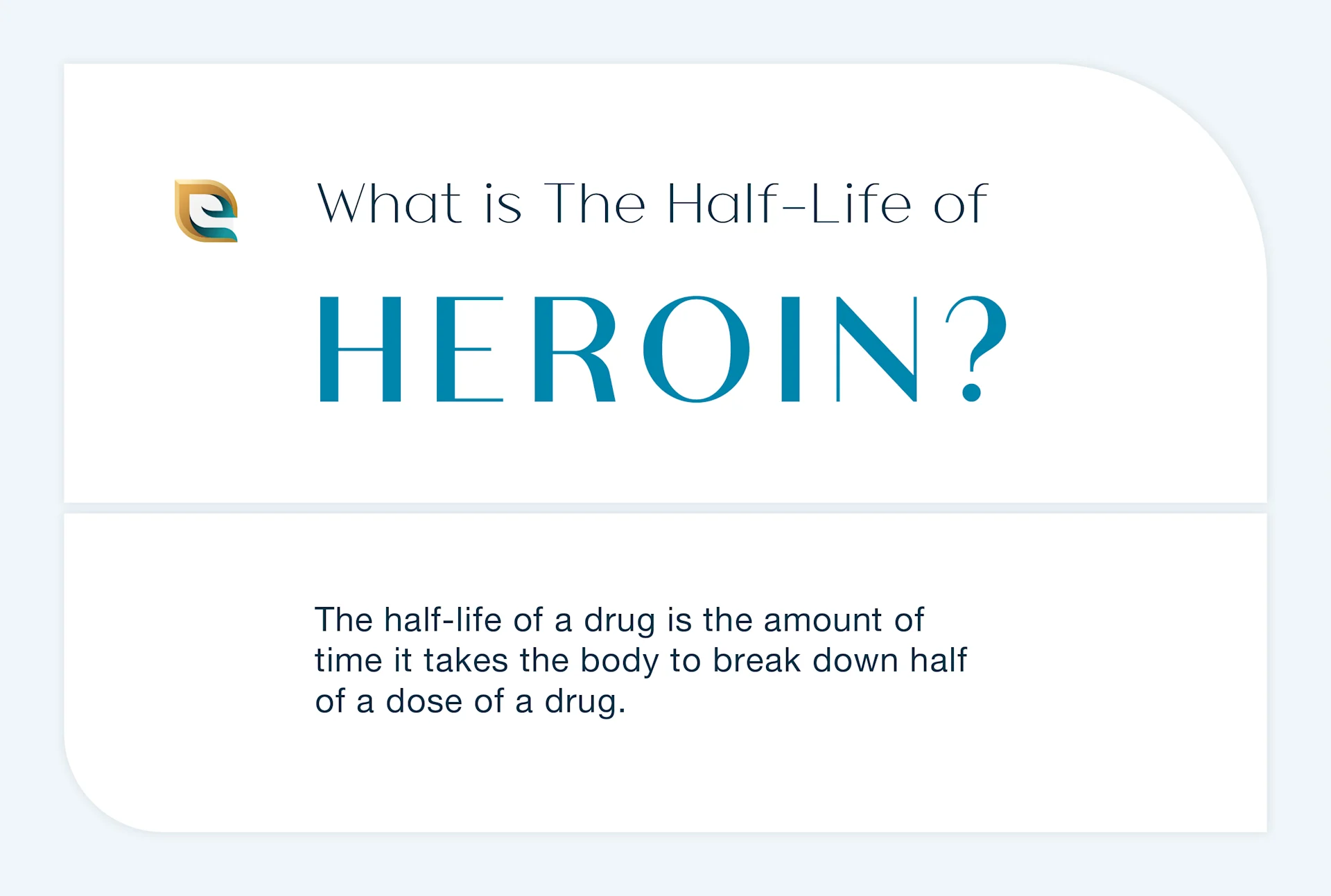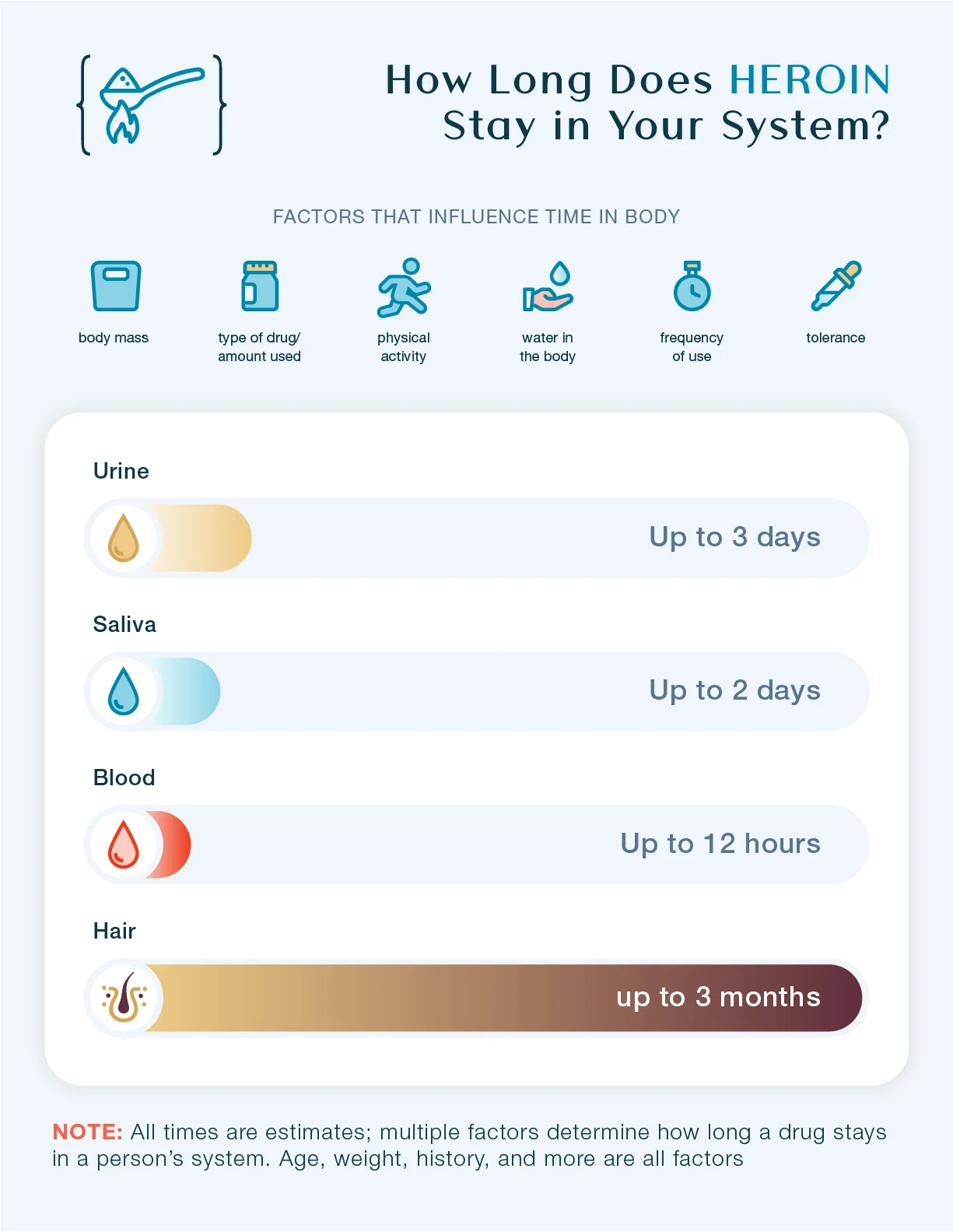Drug and Alcohol - Sobriety
How Long Does Heroin Stay in Your System?

Do you know how long heroin stays in your system? Our blog discusses heroin's surprising half-life, the risks of addiction, and more.
Heroin addiction is a serious problem in the United States and has been on the rise recently.
It's a chronic disease characterized by a strong physical and psychological dependence on the opioid drug heroin. Addiction to opioids like heroin can cause a wide range of physical and mental health problems. However, effective treatment for heroin addiction can help to address these problems and improve the quality of life for individuals struggling with opioid abuse.
By the Numbers
Data from the Centers for Disease Control and Prevention(CDC) shows overdose deaths involving heroin increased by about seven times in 2020 compared to 1999. Heroin was a cause of over 20% of all opioid-related fatalities. Nearly 143,000 people died from overdoses involving heroin from 1999-2000.
What Is Heroin?
Heroin is a powerful opioid drug that is derived from morphine, which is extracted from the opium poppy plant. It is a highly addictive and dangerous drug that can cause significant physical and mental health problems, including overdose and death.
The drug is typically used illicitly by injection, snorting, or smoking. When someone uses heroin, it quickly enters the brain and binds to opioid receptors, leading to a rush of euphoria and relaxation. However, with repeated use, the brain and body adapt to the drug, leading to a tolerance to its effects and requiring more of the drug to achieve the same high.
Heroin is typically sold on the street in a powder form, often cut with other substances such as sugar, starch, or powdered milk. In some cases, heroin can be cut with other drugs, including lethally powerful ones such as:
The purity and strength of street heroin can vary widely, making it difficult to predict its effects or to use the drug safely.
What Are the Effects of Heroin on Health?
Heroin use can cause a wide range of physical and mental health problems. Physical health problems include respiratory depression, constipation, collapsed veins, skin infections, and an increased risk of infectious diseases like HIV and hepatitis C.
Mental health problems include anxiety, depression, paranoia, and other mood disorders.
Effective treatment for heroin addiction often involves a combination of medications and behavioral therapies, such as methadone or buprenorphine maintenance therapy, cognitive-behavioral therapy, and contingency management. Ongoing support through support groups, counseling, and other resources can also be beneficial in managing addiction and preventing relapse.

We’re Here To Help You Find Your Way
Would you like more information about how long heroin stays in your system? Reach out today.
How Does Heroin Work?
When heroin enters the brain, it rapidly crosses the blood-brain barrier and binds to opioid receptors located on the surface of nerve cells, or neurons, throughout the brain and spinal cord. These opioid receptors are usually activated by naturally occurring neurotransmitters, such as endorphins, which help regulate pain, stress, and mood.
Heroin and other opioids bind to the same receptors as these natural neurotransmitters, but they are much more potent and produce a much stronger effect on the brain. The binding of heroin to these receptors leads to the release of dopamine, a neurotransmitter associated with pleasure and reward, producing a rush of euphoria and relaxation.
With repeated use, the brain and body adapt to the drug, leading to a tolerance to its effects and requiring more of the drug to achieve the same high. In addition, chronic use of heroin can cause long-term changes in the brain, leading to alterations in brain circuits that regulate mood, behavior, and decision-making. These changes can contribute to the development of addiction and the cycle of compulsive drug seeking and use.
In addition to its effects on dopamine, heroin also affects other neurotransmitters in the brain, such as norepinephrine and serotonin, which regulate stress, arousal, and mood. These effects can contribute to the physical and psychological symptoms of withdrawal that occur when someone stops using heroin, such as anxiety, agitation, and insomnia.
Thus, heroin and other opioids can have a profound and lasting effect on the brain, leading to changes in brain circuits that regulate mood, behavior, and decision-making. These changes can contribute to the development of addiction and the cycle of compulsive drug seeking and use. Therefore, effective treatment for heroin addiction often involves addressing these changes through a combination of medications and behavioral therapies.
How Long Does Heroin Stay in the System? A Timeline
The length of time that heroin stays in the body can vary depending on several factors, including the dose, frequency, duration of use, the person's metabolism, and the method of use. Heroin has a relatively short half-life, which is the time it takes for half of the drug to be eliminated from the body.
The half-life of heroin is estimated to be between 2 and 6 minutes, depending on the method of use. When heroin is injected, it typically reaches peak levels in the bloodstream within a few minutes and then rapidly declines as the drug is metabolized and excreted from the body. However, the effects of heroin are felt for far longer. The body metabolizes heroin into 6-acetyl morphine and morphine. Morphine has a longer half-life: it lasts for up to seven hours.
The metabolites of heroin, or the byproducts of the body's breakdown of the drug, can be detected in urine, blood, and saliva for varying periods after use. The detection window for heroin and its metabolites depends on the sensitivity of the drug test, the amount and frequency of drug use, and individual factors such as body weight, hydration status, and liver and kidney function.

Drug Tests and Heroin
Here is a breakdown of how long heroin can stay in the body and be detected by various drug tests:

Urine: Heroin and its metabolites can be detected in urine for 2-3 days after use. However, heavy or chronic use may result in a longer detection window of up to a week or more.
Blood: Heroin is rapidly metabolized in the body, and its detectability in the bloodstream declines quickly after use. Heroin and its metabolites can typically be detected in blood for up to 6-12 hours after use, although this window may be shorter for some people.
Saliva: The drug can be detected in saliva for up to 5-48 hours after use, depending on the sensitivity of the test and the individual's metabolism.
Hair: Heroin and its metabolites can also be detected in hair for a longer period, up to several months after use. Therefore, hair testing is not as commonly used as other drug tests but can provide a longer-term record of drug use.
However, drug tests are unreliable indicators of drug use or impairment. Other factors, such as drug tolerance and opioid withdrawal symptoms, can complicate the interpretation of drug test results.

We’ll Lead You to New Heights
Do you have more questions about how long heroin stays in your system? Reach out.
Symptoms of Heroin Addiction
Heroin addiction, like other substance use disorders, can cause physical, psychological, and behavioral symptoms. Here are some of the most common symptoms of heroin addiction:
Physical Symptoms
Heroin use can cause a range of physical symptoms, including:
Needle marks or bruises on the arms or legs (if injected)
Nausea and vomiting
Constipation
Itchy skin
Dry mouth
Constricted (small) pupils
Slow or shallow breathing
Slurred speech
Drowsiness or sedation
Psychological Symptoms
Heroin addiction can also cause a range of psychological symptoms, including:
Euphoria or intense pleasure
Feelings of detachment or dissociation
Depression or anxiety
Mood swings
Irritability or agitation
Difficulty concentrating
Memory problems
Loss of interest in activities that were once enjoyable
Cravings for heroin
Behavioral Symptoms
Heroin addiction can also cause changes in behavior, such as:
Neglecting responsibilities at work, school, or home
Engaging in risky behaviors, such as driving while under the influence of drugs
Withdrawing from social activities and relationships
Spending a lot of time and money obtaining and using heroin
Continuing to use heroin despite negative consequences, such as legal problems, financial problems, or health problems
Trying to quit using heroin but being unable to do so on their own
However, not everyone who uses heroin will become addicted, and not all individuals with heroin addiction will experience all of these symptoms
Reasons For Heroin Addiction
Similar to other drug addictions, addiction to heroin can be the result of a complex interaction between genetic, environmental, and psychological variables. Here are some of the key reasons why people can become addicted to heroin:
Pleasure and euphoria: Heroin produces a powerful and immediate rush of pleasure and euphoria in the brain, which can create a strong incentive to continue using the drug to replicate these feelings.
Relief from pain and stress: Heroin also has powerful pain-relieving properties and can relieve physical and emotional pain or stress. This can make the drug appealing to people experiencing chronic pain, trauma, or emotional distress.
Social and cultural factors: Heroin use can also be influenced by social and cultural factors, such as peer pressure, societal attitudes towards drug use, and the availability of the drug in certain communities.
Genetics: Some research has suggested that genetic factors can play a role in predisposing some people to addiction, although the specific genes and mechanisms involved are not yet well understood.
Mental health issues: People with certain mental health conditions, such as depression, anxiety, or trauma-related disorders, may be more vulnerable to developing an addiction to heroin as a way of self-medicating their symptoms.
Environmental factors: Childhood trauma, unstable family environments, poverty, and other environmental factors can also contribute to a higher risk of developing an addiction to drugs, including heroin.

We’re Here To Help You Find Your Way
Do you need advice about how long heroin stays in your system? Reach out today.
How to Help Someone Dealing With Heroin Addiction
Dealing with someone who is addicted to heroin can be challenging, but it is essential to approach the situation with compassion, understanding, and patience. Here are some steps you can take to help someone who is addicted to heroin:
Educate yourself: Learn as much as you can about heroin addiction, its effects on the brain and body, and the treatment options available. This will help you better understand what your loved one is going through and how to support them best.
Express your concerns: Talk to your loved one and express your desire to help them. Be honest and non-judgmental, and avoid blaming or shaming them for their addiction.
Encourage treatment: Encourage your loved one to seek treatment for their addiction. This may include medication-assisted treatment, behavioral therapy, or a combination of both. Offer to help them find a treatment program and provide support throughout the process.
Set boundaries: It is important to set boundaries with your loved one to protect your own well-being. This may include refusing to enable their addiction, such as lending them money or providing them with drugs and prioritizing their own needs.
Seek support: Supporting someone with heroin addiction can be emotionally taxing, so it is crucial to seek support for yourself. Consider attending a support group for family members of individuals with addiction or seeking counseling to help you cope with the situation.
Recovery from heroin addiction is a long and challenging process, and relapse is common. Thus, it is important to be patient and supportive and to celebrate any progress your loved one makes toward recovery.
How Heroin Addiction Is Treated
Heroin addiction is a serious problem that can devastate individuals and their loved ones. Effective treatment for heroin addiction typically involves a combination of medications, behavioral therapies, and support services to help individuals manage withdrawal symptoms, address the underlying causes of their addiction, and develop the skills and strategies needed to maintain sobriety.
Here are some of the most common and effective treatment options for heroin addiction:
Medications
Medications like methadone, buprenorphine, and naltrexone are used to manage withdrawal symptoms and reduce cravings for heroin. Methadone and buprenorphine are opioid medications that can help to prevent withdrawal symptoms and reduce cravings. At the same time, naltrexone is a medication that blocks the effects of opioids in the brain, making it less likely for someone to relapse.
Behavioral Therapies
Cognitive behavioral therapy (CBT) and contingency management are used to help individuals identify and address the underlying factors contributing to their addiction, develop coping strategies to manage cravings and triggers, and learn new skills to support long-term recovery.
Support Groups
Support groups provide a safe and supportive environment where individuals can share their experiences, receive encouragement and support from others who have gone through similar struggles, and learn effective strategies for maintaining sobriety.
Inpatient Drug Rehab
Inpatient drug rehab involves staying in a residential treatment facility for some time to receive intensive, round-the-clock care and support. Inpatient treatment can be particularly beneficial for individuals struggling with severe addiction or with co-occurring mental health disorders requiring specialized care.
Outpatient Drug Rehab
Outpatient drug rehab involves regularly attending therapy and support groups while living at home. Outpatient treatment can be a good option for individuals who have completed inpatient treatment or who have a less severe addiction and can manage their recovery while still maintaining their daily responsibilities.
Addiction treatment is not a one-size-fits-all approach; what works for one individual may not work for another. Instead, effective treatment for heroin addiction typically involves a combination of these strategies tailored to meet the individual's specific needs and circumstances.

We’ll Lead You to New Heights
Would you like more information about how long heroin stays in your system? Reach out today.
Don't Risk a Heroin Overdose! Reach Out to The Edge Treatment Center Today
The Edge Treatment Center is dedicated to helping individuals overcome addiction to heroin. We understand that addiction to heroin is a grave issue requiring specialized care and support. Our team of healthcare professionals is trained to provide evidence-based treatments and therapies that can help individuals manage withdrawal symptoms, reduce cravings, and ultimately achieve long-term recovery.
Our goal is to provide a comprehensive approach to addiction treatment that addresses the physical symptoms of addiction and the emotional and social factors that can contribute to substance abuse. Don't risk an opioid overdose. Reach out to The Edge Treatment Center today.

We’re Here To Help You Find Your Way
If you or a loved one is struggling with addiction, there is hope. Our team can guide you on your journey to recovery. Call us today.
Written by
 Brian Moore
Brian MooreContent Writer
Reviewed by
 Jeremy Arzt
Jeremy ArztChief Clinical Officer
Drug and Alcohol
Sobriety
February 18, 2025
